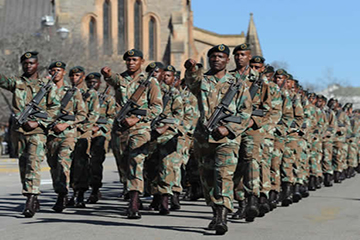The SANDF would be better suited to dealing with the needs of the nation Photo Western Cape Government
South Africa – In recent years, the role of the South African National Defense Force (SANDF) has come under scrutiny due to various challenges it faces. there have been significant changes in the defence budget, as well as shifts in the tasks and responsibilities of the military. As such it may be time for the SANDF to switch its priorities completely and focus on what it actually does.
One of the primary challenges facing the SANDF is the declining defence budget. Year after year, the budget has been reduced, limiting the resources available for the organisation. It currently stands at approximately 1% of GDP. In light of this, Jakkie Cilliers, Head of African Futures & Innovation, Institute for Security Studies (ISS), argued the SANDF should focus on actual tasks that align with the country’s needs.
“It’s very low by comparable standards but that’s probably where it’s going to level off. My argument essentially is that what we should be doing is using, preparing, training and equipping the military for the actual tasks that it does. Those tasks are participation and peace missions such as in Mozambique and in the Eastern DRC. Border security, border protection and support to the police and then finally emergency response such as when there is a flood or a disaster.”
Rather than preparing for conventional defence against foreign enemies, like Swaziland or Botswana, the SANDF should prioritise addressing threats such as organised crime and terrorism. This is the best way to utilise the limited budget.
Problems with the SANDF
SANDF are unable to take financial accountability, with instances of mismanagement and scandals related to spending. The auditor general has repeatedly reported poor management within the department, which needs to be addressed. Additionally, the organisation is heavily overstaffed, with a surplus of generals and admirals. Cilliers suggested removing the superfluous defence secretariat that deals with military veterans affairs from the department.
“There’s a small stem and a huge oversupply of generals and admirals within the Department of Defense. The vast majority of which, sadly, need to be retrenched or set out to retirement. Then there are structural problems. We have a superfluous defence secretariat. The department deals with military veterans affairs and spends a tremendous amount of money on paying out former uMkhonto we Sizwe, APLA and SANDF soldiers. All of these functions should be removed from the department so you can get back to a lean, effective structure that is optimised for the actual tasks that are at hand.”
SMread: Morningside residents irate over poor service delivery
The role of the SANDF
The primary role of the SANDF is to protect South Africa’s territorial integrity. However, this does not primarily involve preparing for conventional warfare but rather addressing criminal activities and illegal border crossings. South Africa resides in a relatively peaceful and stable region, where conventional threats are not prominent. Instead, the focus should be on organised crime, terrorism, and other non-conventional threats.
“The threats are organised crime, terrorism and so on …. We’ve seen repeatedly when there is something like the riots that we saw in KwaZulu-Natal, the military is rolled out and 25 000 SANDF soldiers were deployed to support the police, but they are not equipped. They are not trained for their duty to support the police. So, they do guard duty because they cannot effectively support the police. We should train and equip the military to support the police in a much more effective manner than is the case.”
The establishment of the new border management agency is seen as an unnecessary expenditure by Cilliers. Instead, existing entities like the military, police, home affairs, and SARS should be empowered to enhance their capabilities.
Defence policy and alignment with resources
The current defence policy is outdated with the last revision coming 15 years ago. According to Cilliers, the policy should be revised every two to three years and this is one of the reasons why it no longer aligns with South Africa’s current security needs.
“Our defence policy to the extent that it exists is completely out of date … The defence policy is a mess. Accountability is a mess. The structures within the department are antiquated and bloated. It requires a clean out. The minister announced that she’s going to undertake some new thinking but the changes that I am recommending will ultimately have to be approved by parliament because it is quite a change from the last white paper which was approved more than 15 years ago. South Africa really needs to get serious about aligning its defence capabilities with the defence budget.”
Allocating resources towards these areas, such as acquiring transport helicopters and aircraft instead of attack helicopters, will better align the SANDF with South Africa’s needs and available funding.
The challenges facing the SANDF require a comprehensive and strategic approach to ensure its effectiveness. By focusing on actual tasks aligned with South Africa’s security needs, addressing internal problems, improving accountability, and developing an updated defence policy, the SANDF can overcome its challenges and better serve the nation. It is crucial for the government to prioritise funding for the defence force to provide it with the necessary resources to fulfil its role in safeguarding the nation’s security.
In a captivating conversation, Jakkie Cilliers engaged with Inayet Wadee, delving into the intricacies of tailoring the SANDF to the specific needs of the country. Their discussion traversed the challenges that lie before the Defense Minister and the essential steps required to ensure the SANDF fulfils its vital role. Listen to that discussion here:
